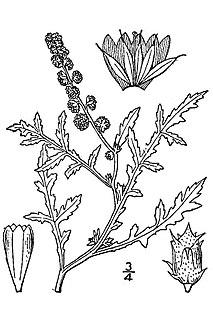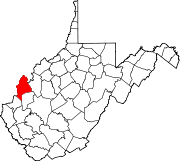
In the ancient Greek myths, ambrosia is sometimes the food or drink of the Greek gods, often depicted as conferring longevity or immortality upon whoever consumed it. It was brought to the gods in Olympus by doves.

Ragweeds are flowering plants in the genus Ambrosia in the aster family, Asteraceae. They are distributed in the tropical and subtropical regions of the Americas, especially North America, where the origin and center of diversity of the genus are in the southwestern United States and northwestern Mexico. Several species have been introduced to the Old World and some have naturalized and have become invasive species. Ragweed species are expected to continue spreading across Europe in the near future in response to ongoing climate change.

Ambrosia Software was a predominantly Macintosh software company located in Rochester, New York, U.S. Ambrosia produced utility software and video games. Its products were distributed as shareware; demo versions could be downloaded and used for up to 30 days.
Ambrosia beetles are beetles of the weevil subfamilies Scolytinae and Platypodinae, which live in nutritional symbiosis with ambrosia fungi. The beetles excavate tunnels in dead or stressed trees in which they cultivate fungal gardens, their sole source of nutrition. After landing on a suitable tree, an ambrosia beetle excavates a tunnel in which it releases spores of its fungal symbiont. The fungus penetrates the plant's xylem tissue, extracts nutrients from it, and concentrates the nutrients on and near the surface of the beetle gallery. Ambrosia fungi are typically poor wood degraders, and instead utilize less demanding nutrients. The majority of ambrosia beetles colonize xylem of recently dead trees, but some attack stressed trees that are still alive, and a few species attack healthy trees. Species differ in their preference for different parts of trees, different stages of deterioration, and in the shape of their tunnels ("galleries"). However, the majority of ambrosia beetles are not specialized to any taxonomic group of hosts, unlike most phytophagous organisms including the closely related bark beetles. One species of ambrosia beetle, Austroplatypus incompertus exhibits eusociality, one of the few organisms outside of Hymenoptera and Isoptera to do so.
Ambrosia is sometimes the food, sometimes the drink, of the gods of Greek mythology.

Ambrosia is an American rock band formed in southern California in 1970. Ambrosia had five Top 40 hit singles released between 1975 and 1980, including the Top 5 hits "How Much I Feel" and "Biggest Part of Me". Most of the original band members have been active with the group continuously for well over 25 years to the present day.

A bark beetle is one of about 220 genera with 6,000 species of beetles in the subfamily Scolytinae. Traditionally, this was considered a distinct family Scolytidae, but is now understood to be very specialized members of the "true weevil" family (Curculionidae). Well-known species are members of the type genus Scolytus, namely the European elm bark beetle S. multistriatus and the large elm bark beetle S. scolytus, which like the American elm bark beetle Hylurgopinus rufipes, transmit Dutch elm disease fungi (Ophiostoma). The mountain pine beetle Dendroctonus ponderosae, southern pine beetle Dendroctonus frontalis, and their near relatives are major pests of conifer forests in North America. A similarly aggressive species in Europe is the spruce ips Ips typographus. A tiny bark beetle, the coffee berry borer, Hypothenemus hampei is a major pest on coffee plantations around the world.
David Robert Pack is an American musician and singer who co-founded the rock group Ambrosia in the 1970s.

Ambrosia artemisiifolia, with the common names common ragweed, annual ragweed, and low ragweed, is a species of the genus Ambrosia native to regions of the Americas.

Pillars of Garendall is a role-playing video game that was built by Beenox Studios and Ambrosia Software. It was built using the Coldstone game engine, which was also a joint Beenox/Ambrosia project. The game was released in 2001 for Mac OS Classic, Microsoft Windows and Mac OS X.

Ambrosia dumosa, the burro-weed or white bursage, a North American species of plants in the sunflower family. It is a common constituent of the creosote-bush scrub community throughout the Mojave desert of California, Nevada, and Utah and the Sonoran Desert of Arizona and northwestern Mexico.

Ambrosia is an American variation of fruit salad. Most ambrosia recipes contain fresh or sweetened pineapple, mandarin oranges or fresh orange sections, miniature marshmallows, and coconut. Other ingredients can include maraschino cherries, bananas, strawberries, peeled grapes, or crushed pecans. Ambrosia can also include whipped cream, sour cream, cream cheese, pudding, yogurt, mayonnaise, or cottage cheese. The mixture is refrigerated for a few hours or overnight before serving.

Ambrosia Anderson is an American professional women's basketball player.

Ambrosia trifida, the giant ragweed, is a species of flowering plant in the sunflower family. It is native to North America, where it is widespread in Canada, the United States, and northern Mexico. It is present in Europe and Asia as an introduced species, and it is known as a common weed in many regions. Its common names include great ragweed, Texan great ragweed, giant ragweed, tall ragweed, blood ragweed, perennial ragweed, horseweed, buffaloweed, and kinghead.

Billy is a musical based on the novel and play Billy Liar by Keith Waterhouse and Willis Hall. The book was written by Dick Clement and Ian La Frenais, the music is by John Barry, and the lyrics are by Don Black.

'Ambrosia' is a cultivar of apple originating in British Columbia in the early 1990s. The original tree was first cultivated by the Mennell family of Similkameen Valley, British Columbia, who discovered it growing in their orchard.

Ambrosia tomentosa, the skeletonleaf bur ragweed, silverleaf povertyweed, or skeleton-leaf bursage, is a North American species of perennial plants in the.
Ambrosia deltoidea is a North American species of flowering plant in the aster family known by the common names triangle bur ragweed, triangle bursage, and triangleleaf bursage.

"How Much I Feel" is a 1978 song by American rock band Ambrosia. The song, written by the band's guitarist/vocalist David Pack, was released in the summer of 1978 as the lead single from their third album, Life Beyond L.A., peaking at position three on the Billboard Hot 100 chart and number two for three weeks on the Cash Box Top 100.

Ambrosia Mill is a populated place situated in Maricopa County, Arizona. It has an estimated elevation of 2,211 feet (674 m) above sea level.





















